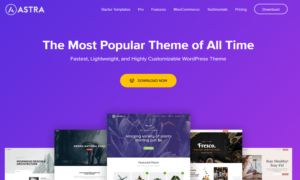Learn all about how to create kick-ass local landing pages in this Whiteboard Friday with Amanda Jordan. Discover the most popular features and get to know the dos and don’ts when creating local landing pages.
Click on the whiteboard image above to open a high-resolution version in a new tab!
Video Transcription
Hi, I’m Amanda Jordan at RicketyRoo, and today I’m going to be talking about how to create kickass local landing pages. I talked about this topic at MozCon in 2022. I did some research on the top 50 pages in the U.S. and home services businesses that ranked on the first page, and then I reviewed those pages and analyzed the features that they were using on those pages to determine what makes a winning location landing page.
Most popular features of local landing pages

So the most popular features are listed here. Sixty-one percent of the home services businesses that ranked on the first page had reviews on their location landing pages. I think that’s pretty much a given now, even though only 61%, there is 39% who were not doing it. But that’s pretty much a given in my opinion that you should have reviews on that page, if for any other sake other than being able to use the structured data for it, for the conversion rate optimization, just providing users with a reason to trust you and believe that you’re good at your job.
So like just for any other reasons, that would be the basic reasons why you want to do that. Thirty-two percent had a unique value proposition, so something to set them apart from their competitors. I think that’s actually very low, and that should be something that really all businesses should be striving for is setting themselves apart. You don’t want to just be another site that’s saying, “Hey, you can give me money for my services.”
You would want them to know why they want to choose you, and that is something that you do in your unique value proposition. Only a quarter of them included any type of sale or a coupon, which is a huge missed opportunity. So if you’re seeing that your competitors aren’t offering a coupon or sale, that’s an opportunity for you to snag business from them. If they’re shopping around and going to multiple websites, if you’re the only one that is offering a coupon, they don’t know that you might be, I don’t know, 10% more expensive from your competitor until they call and get a quote.
So if you’re offering 15% off, you may actually snag a customer and only have to give them 5% off because they don’t know what your prices are compared to your competitor. So that is a good way to get more clients in and get more conversions. Then only 18% had awards or recognitions mentioned on the page. I think that’s a missed opportunity as well because those are trust signals. Those show people that they can trust your business, that you’re recognized in your industry, that you do good work.
So these are the features that I found on those businesses in the top 50 most populated cities in the United States. Where they ranked on the first page, these are the features they were using the most. There were some standouts where they had almost everything you could think of as far as features, and then there were others where they were getting lucky, like low competition. Their business has been around for a really long time, so they didn’t have to put in that much effort to rank well because everyone knew them and they’re almost like a fixture in their community.
So if you look for plumbing in that city, that’s just what’s going to show up.
Answer these questions when thinking about your pages

So really, when you’re thinking about your location pages, you should be trying to answer these questions. I put them here because I think like a detective a lot of times when I review sites, and I like “True Crime” a lot, so I think about it as kind of putting together what am I looking for, almost like Clue.
You want to know what’s going on. Who did what, where, when, why, how? So when you look at your competitors, answer these questions, and when you’re thinking about your own location landing pages, answer these questions too. Who are you trying to reach out to? Who are you? What’s your business? What are you trying to offer them?
What are their concerns? Why should they choose you over competitors? When are you the best choice for them? Where can they contact you, and how can they contact you? All of these questions should be answered on every location landing page. If you’re not answering all these questions, then people are going to have to search around on your website to find those answers, or they’re just going to leave and go to a competitor who can more easily answer those questions.
If you think about it, this is a lot of what Google tries to answer in your Google Business profile as well. So you should be matching up not necessarily word for word what’s on it, but think about the features that Google is trying to show in their own tool and make sure that those features also exist on your location landing page.
To answer those questions, look at the data

So you want to answer these questions, and how you want to answer them, you want to use these types of data.
You want to use first-party data. So you know your customers. You’ve worked with them. You likely have a CRM that you use. You want to use that CRM to accumulate valuable data and use it on your pages. If you know that at certain times of the year certain issues exist for a certain amount of houses and you’re in home services, say the summer months, you already know in the summer months AC units are going to need maintenance and repair.
Put the percentage of homes that you serve with those issues during those months on that page in that area. That’s automatically adding unique content that no one else has and that Google is going to see too as unique content, that’s data-driven content, that’s interesting content. So not only is it something that is unique to your page and not more generic than content that people are used to seeing, but it’s also something that may be interesting enough that people will share with others, that may be used for other reasons as a source for other things as well.
Third-party data. So you want to use statistics, FAQs, things that you can find around the internet that you know is true, that is relevant to your business and is relevant to that specific location so that you can be as unique as possible within your content without being duplicative at all. Then user- generated content.
Your users should be leaving you reviews. If they’re not leaving you reviews, you should be asking them to leave reviews. So that’s one of the things that you can do. Comment sections on websites. There are lots of clients that I’ve had, especially in e-commerce, where they have e-commerce and local together, where they have a comment section where people can talk about their experiences, not like in a review place, would ask questions, give feedback on some things, things like that, communicate with each other, almost like a forum sometimes too.
That’s a ton of user-generated content that’s right there that you didn’t have to write, that’s about your products and services in your business. It will show up in Google as well. So it’s more usable content that you could have someone else produce for you.
Dos and don’ts of creating local landing pages

Here are my do’s and don’ts of creating a location landing page. I’m going to start with the don’ts because I see these issues frequently.
Even when businesses have the best intention, when they’ve hired an SEO, when they’ve hired a marketing director, I see that they run into these issues a lot, and they’re hard to overcome. Not to belittle, they are difficult. Duplicate content is a huge issue for location landing pages. Thin and generic content are huge issues. But if you look at your data sources that you could actually pull from easily with scalability, so you don’t have to worry about someone having to go through and write about unclogging a toilet 200 different ways.
You can pull your data about how many house calls you’ve gotten about unclogging toilets seasonally, by area, by ZIP code. Use that data on that page instead. That’s so much more interesting than saying like, “Hey, if you have a clogged toilet, come call us.” Everyone knows that you want them to do that. You can make that page more interesting.
You could have reviews about people who called you for specific types of issues on that page as well to facilitate that uniqueness and personalization for the user. So really the duplicate content and the thin and generic content issues are solved if you use first-party, third-party, and user-generated content. They will solve those issues for you, and it doesn’t have to be something extremely labor intensive.
A lot of this data can be pulled from Google Sheets into your website. Don’t treat it like a blog. That is another issue I see very commonly is that a business will say, “We need a ton of content to get people to come to our location landing page. We want this page to rank really well.” But they forget that it’s also about bringing someone in and making them want to make a decision to work with you on that one page.
It’s the landing page, so they shouldn’t have to go anywhere else to determine if they want to work with you or not. By answering these questions, you give them all the information they need to decide that they want to work with you, and you want to do it in a way that’s engaging and interesting. So you don’t want to have a huge block of text with nothing breaking it up. You want to include any sales or coupons, awards, reviews, and unique value propositions throughout that content to break it up and give them multiple opportunities to decide that they’ve read enough, they’ve heard enough, and they’re ready to work with you.
So these are my steps and recommendations for creating a kickass local landing page. If you want to discuss more, you can find me on Twitter @amandatjordan.
Video transcription by Speechpad.com
We hope you’re as excited as we are for August 7th and 8th to hurry up and get here. And again, if you haven’t grabbed your ticket yet and need help making a case we have a handy template to convince your boss!

Register for MozCon


